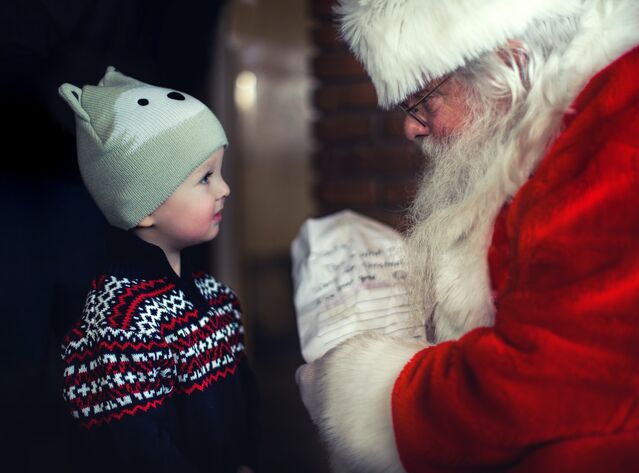Stress
9 Ways to Support Your Sensitive Child Through Christmas
Helping neurodivergent children experience calm during the chaos of Christmas.
Posted December 22, 2020 Reviewed by Ekua Hagan

For many people, the thought of the “holiday season” brings up images of Christmas festivities, a relaxing break from work, and time with loved ones. But the reality is that the Christmas season can also feel hectic and stress-inducing.
Given that many adults experience the holiday season as stressful and overstimulating, it is understandable that many children find Christmas both exciting and overwhelming; add into the mix the traits of temperamental sensitivity and emotional reactivity, or other neurobiological differences, such as autism, and Christmas can be a recipe for overstimulation, overwhelm, and meltdowns for kids.
Like adults, children differ in the way their bodies register, process, and respond to information coming in from their environment. While some children have higher thresholds for reacting to environmental information, requiring a greater level of input to notice the stimuli, others have much lower thresholds and are prone to becoming overstimulated more easily and with less input. For example, a child with a higher neurological threshold may function well in busy, loud, and chaotic environments, while a child with lower thresholds may become overstimulated and struggle to cope.
As parents, caregivers, and adults, what are the ways that we can support children—especially our sensitive children— to experience calm amongst the chaos of Christmas and help them to manage overstimulation?
Create a space for children to retreat to during holiday events.
When children become overstimulated or overtired, a quiet and calming space is often just what their sensitive nervous systems need to reset. If your little one is still having daytime naps or you are staying out late at an event, then a space away from the noise and commotion suitable for napping and sleeping can help you to maintain your child’s sleep routine and help your child get enough rest.
For older children, a quiet space where they can “zone out” may be helpful in reducing overstimulation and allowing them to calm down. Pick your battles. Erin Bulluss, Ph.D., suggests Christmas may not be the best time to enforce rules about screen time; if screen time allows your child to self-regulate and zone out, then consider being flexible with your rules around this and allow your children additional screen time where this is helpful.
If you have multiple social events to attend in one day and your child is prone to overstimulation and fatigue, consider going home for a rest between events.
Allow children to socialise with adults on their own terms.
You may feel like it’s important for your child to talk to Aunt Jan who’s visiting from interstate or to sit on their great grandma’s lap, but if your child doesn’t see these people often, interacting with them may be stress-inducing for your child. You can offer greetings and speak on behalf of your child when this is helpful. For example, “Billy, this is your great aunt from Ballarat; Aunt Jean, Billy might not feel ready to say "Hi." Allow your child to initiate interactions with others when they feel ready to.
Don’t make kids hug and kiss relatives that you feel close to, but they barely know. In fact, don’t make children kiss or hug anyone. Full stop.
Allow children to have some choice about how they receive gifts.
We all vary in how we feel about giving and receiving gifts and how we prefer gift giving to take place. Some of us delight in unwrapping presents in front of a circle of extended family members, while some of us dread being watched as we unwrap a gift and prepare the socially appropriate reaction to receiving the gift.
It is common for sensitive children to dislike being watched while performing a task or activity; for many kids, this includes unwrapping gifts. If your child is prone to shyness, self-consciousness, or social anxiety, they may be more comfortable unwrapping gifts in private or 1:1 with the gift-giver.
Bulluss says that for many autistic kids, surprises can be anxiety-provoking. Some children may prefer to know what their gifts are ahead of time. Many of the neurodivergent families I work with in my psychology practice, have older children choose their own gifts so that they know exactly what they are getting on Christmas Day. In other words, no surprises.
Allow children access to familiar foods.
Many of adults’ favourite Christmas foods are not appealing to kids. Children should have autonomy over what new foods they try or don’t try. Ensure that your child has access to some of their favourite healthy or familiar food items on Christmas Day in case they don’t like the traditional Christmas food on offer. Just as we wouldn’t like to be forced by another adult to eat foods that we don’t like, children generally don’t react well to being forced to eat certain foods.
Bulluss reminds us that if your child is a “fussy eater,” don’t expect that to suddenly change on Christmas Day. Save yourself and them the stress and fuss in front of the extended family by bringing along their favourite foods from home if you are eating at someone else’s house or a public venue.
It may not be realistic to expect a young child to sit at the table for a seated lunch or dinner. Where possible, give children the freedom to graze through the day and to come and go from the dinner table as they like. You are the expert on your child’s eating preferences. Where possible try to accommodate those preferences during holiday events. A battle over food on Christmas Day is no one’s idea of fun!
Allow your child to use you as a “secure base” during social events and stressful situations.
According to John Bowlby (1988), "all of us, from the cradle to the grave, are happiest when life is organised as a series of excursions, long or short, from the secure base provided by our attachment figures".
Children regulate stress and anxiety levels through closeness and proximity to caregivers they feel safe with. When children experience stress in their environment, this can trigger the activation of their “attachment system” and they may turn towards their attachment figures, seeking help, protection, or support to manage their big emotions. Once children feel safe and settled, they will be ready to explore their environment again, knowing they can use you as their secure base to return to if they encounter something scary or stressful. By allowing your child to use you as their secure base they will be more confident to explore their environment on their own terms.
Expect and accept that children will be more clingy in strange situations, novel environments, and with people they don’t know well.
Get to know the signs that your child is tired or overstimulated and be observant.
Most children will display certain behaviours and cues when they are tired, stressed, or overstimulated. Get to know the signs that your child is becoming overstimulated and step in to offer support early to prevent a meltdown and help them to regulate their arousal levels.
Allow sensory accommodations such as headphones, weighted toys and blankets, and fidgets, and ensure your child has access to their favourite comfort items, like pacifiers, blankets, or their favourite teddy.
Help children to soothe big feelings.
All young children are prone to becoming emotionally dysregulated at times and depend on effective soothing and support from their caregivers to help them cope with intense feelings. For infants and young children, this may include providing rocking, holding, and a soothing tone, while for older children, verbal reassurance, emotional validation, and problem-solving may be helpful.
Children tend to be sensitive to the moods and emotional states of their parents. In order the be the calm refuge your child needs during the holiday season, it is important that you take care of your own emotional needs and seek support if you need it.
Try to keep some routine on Christmas Day.
Christmas is a big disruption to children’s daily and weekly routines. Almost everything is different on Christmas Day and that can be especially challenging for many highly sensitive and autistic children. Try to keep some of the usual routines during Christmas Day and prepare your child in advance for some of the disruptions they can expect in their usual routine.
Educate the extended family about your child’s specific needs ahead of time.
Many of the neurodivergent families I work with provide information to relatives about their children’s specific needs, preferences, and behaviours ahead of social events, and make suggestions for ways family members can support their child and their family. For example, parents may text, “Hi all, Sarah tends to get overwhelmed and can melt down when there’s a lot of noise at once. We will be bringing her noise-canceling headphones for her to wear during the day as she needs them. We would appreciate it if you don’t make a big deal about this.”
Remember, neurodivergent children are still neurodivergent on Christmas Day.




